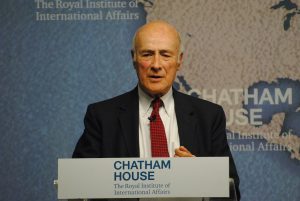In a span of a month, two Americans – former U.S. Deputy Secretary of State Richard Armitage and Joseph S. Nye, Distinguished Service Professor of Harvard University – who were revered figures in Japan passed away. All major newspapers in Japan published both of their obituaries, and Prime Minister Ishiba Shigeru issued official statements regretting their passing. For both Armitage and Nye, Ishiba lauded their “profound insight into U.S. policy toward Japan” and also praised their efforts in “strengthening” the Japan-U.S. alliance in their own ways.
For decades, both in and out of government, Armitage and Nye were strong proponents of a robust Japan alliance. As a member of Republican administrations, Armitage consistently urged the Japanese government to take an active role in the alliance. Meanwhile, Nye played a critical role as assistant secretary of defense for international security affairs under President Bill Clinton, contributing to the development of the so-called “Nye Initiative” – a blueprint that provided strategic direction for an “Alliance Adrift” after the end of the Cold War.
In Japan, they were particularly well known for their advocacy through the “Armitage-Nye Reports,” a strategy paper that has been regularly published since 2000 by an American think tank working group led by these two individuals. The report provides policy recommendations aimed at enhancing Japan’s role as an active supporter within the Japan-U.S. alliance framework.
Although Armitage and Nye were commonly referred to as “chinichi-ha” (知日派) – individuals with a deep understanding of Japan, particularly its society, culture, and politics – the term itself does not imply their sentimental attachment to Japan. Rather, their focus has always been on promoting U.S. interests in relation to Japan.
Former Japanese diplomat Miyake Kunihiko and Nagashima Akihisa, special adviser to the prime minister, both made this point. According to Miyake, Armitage “never once worked for Japan at the expense of U.S. national interests. In my opinion, he was a true patriot who always put America’s national interests first – quite the opposite of Mr. Trump.” Similarly, Nagashima emphasized the distinction between being “chinichi-ha” and being “pro-U.S.-Japan alliance” (親・日米同盟派), noting that Armitage belonged to the latter group.
As for Joseph Nye, Nikkei Shimbun columnist Hiroyuki Akita described him as a strategist whose “commitment to strengthening the U.S.-Japan alliance was based on his insight and reflection on history.” Akita suggested that Nye’s patriotism was his primary guiding principle that called him to participate in alliance building.
While Armitage and Nye were highly respected figures within the Japan-U.S. security community, their calls for Japan to take a more active role were sometimes perceived as insensitive “external pressure” by certain segments of the Japanese public. In the title of an obituary for Armitage, Mainichi Shimbun referenced his “infamous” alleged remark, “Show the flag,” which he had reportedly said to a Japanese official to encourage troop support from the Self-Defense Forces in the “War on Terror.” During Diet deliberations, some progressive members suggested that the signature Armitage-Nye Report functioned as an implicit directive from the United States, aimed at influencing Japanese security policy for Washington’s benefit
However, such conspiratorial thinking denies Japanese agency and minimizes the sincere desire on the part of Japanese officials to enhance their ability to protect their country – which happened to be in alignment with the work of the two U.S. experts. Observing the lack of significant opposition to Japanese military buildup among the Japanese public, it seems safe to say that the public has come to terms with the concerns that Japanese security officials had – and the warning that was behind Armitage and Nye’s works.
In a curious way, the Trump administration appears to have inherited the mantle of the “pro-U.S.-Japan alliance” from two establishment figures whose class he publicly disparages.
In his first meeting with a G-7 leader, Trump met Ishiba in the Oval Office and appeared much more cordial toward him compared to a later, tense encounter with Ukrainian President Volodymyr Zelensky. Trump’s Cabinet members and high-ranking officials have occasionally expressed a preference for engaging with Japan and have emphasized the importance of elevating the bilateral alliance to “new heights.”
However, as was the case with Armitage and Nye, the Trump administration is also not courting Japan for charitable reasons. Defense Secretary Pete Hegseth’s remarks underscore this point. Although he described Japan as an “indispensable partner,” he framed Japan’s utility specifically in terms of “deterring Communist Chinese military aggression.” This aligns with the intent of Armitage and Nye – for the United States, the alliance with Japan is vital for strategic reasons rather than sentimental ones.
With the support of Armitage and Nye, the Japan-U.S. alliance was able to survive and evolve throughout the post-Cold War era. However, as tensions between nations – especially among great powers – have reignited, the next challenge for policymakers will be preparing the alliance for a real contingency.
Such tasks will present vastly different questions compared to the ones Armitage and Nye grappled with during their careers. For much of their involvement with Japan, they sought to define the meaning of the alliance in the absence of an immediate threat, whereas future experts will need to do so in an increasingly volatile environment. If Japan must prepare for a possible contingency, it will require significant political will from both the Japanese government and the public. The backlash is difficult to predict.
While Armitage and Nye frequently engaged with Japanese government officials, they rarely emphasized the importance of convincing the Japanese people to absorb the risks associated with both the success and failure of deterrence – an obligation that, at any given moment, has primarily rested on Japan’s leadership. Addressing this challenge will be critical for the future of Japan-U.S. relations as they move into the next era.

































